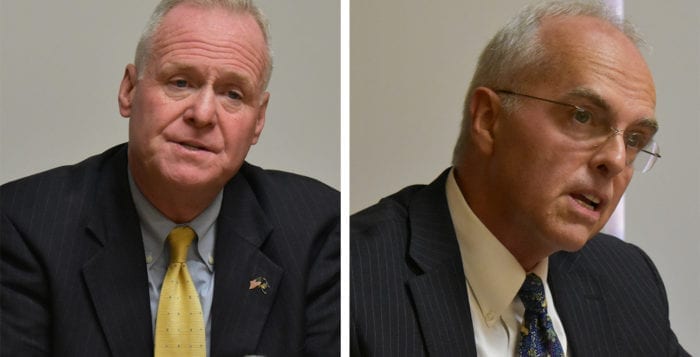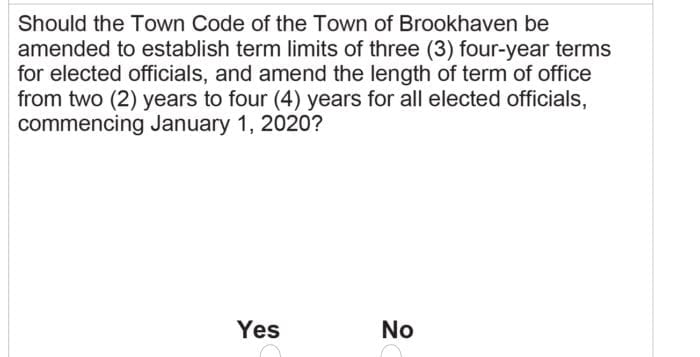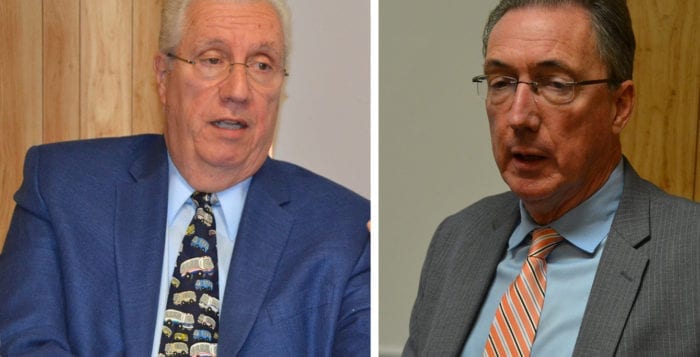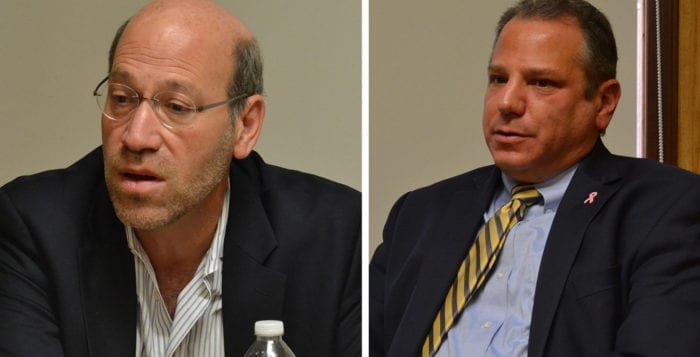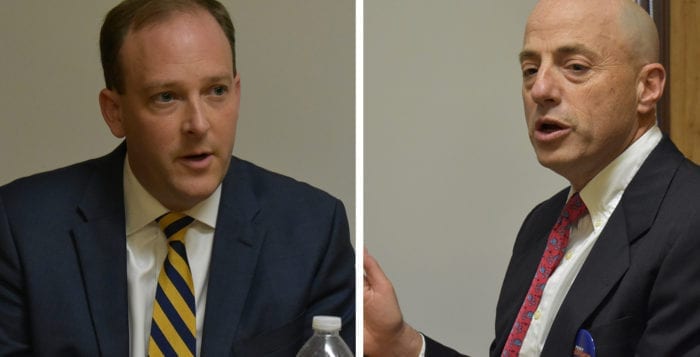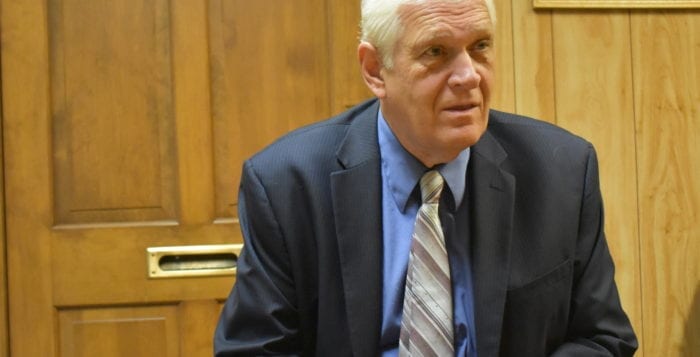House candidates square off for discussion on health care, the economy, the environment and President Trump in TBR exclusive
The result of the race to represent New York’s 1st Congressional District will be monitored by locals closely on election night, but the contest will have far wider implications.
The U.S. House of Representatives has been in Republican control since 2011, but polling suggests Democrats have an opportunity to retake the majority Nov. 6, with the seat of two-term incumbent Rep. Lee Zeldin (R-Shirley) appearing to be among those up for grabs if polls are to be believed. Zeldin faces challenger Perry Gershon, a Democrat who emerged from a field of five in a June primary, who said he has embarked on his first political run because he wants to put a check on President Donald Trump (R) and his congressional supporters.
The candidates sat down together for an exclusive interview with the TBR News Media in Setauket last month for a wide-ranging discussion on the race and their political ideologies.
“I think it’s really important after this election for our country to do a better job uniting, regardless of whether you come in first or second — whether or not your candidate comes in first or second that you voted or volunteered for.”
— Lee Zeldin
The president and the political divide
The current political climate and national discourse is a major motivator behind Gershon’s decision to run, he said. While the candidates agree a problem exists, they voiced competing theories regarding the source.
“I think it’s really important after this election for our country to do a better job uniting, regardless of whether you come in first or second — whether or not your candidate comes in first or second that you voted or volunteered for,” Zeldin said.
Gershon agreed with his opponent’s sentiment, but criticized Zeldin for suggesting it can wait until after Nov. 6.
The incumbent cited the demand for polarized news consumption from the electorate and an in-kind response from the news media as the genesis for the divisive environment at present. However, Zeldin laid blame on both Trump and his vanquished 2016 opponent Democrat Hillary Clinton for failing to voice a message of unity when the dust settled. He also said the Women’s March, which took place the day after Trump’s inauguration, is a contributing factor to the current tone of politics.
“We all have a responsibility, I have a responsibility too,” Zeldin said.
Gershon was less willing to place the blame on a confluence of factors, assigning most of it to the White House.
“In terms of presidential elections, there was never discussion about not accepting the result until Trump [came along],” he said. “That had never been on the table before and Trump put it up there. It’s part of the fear mongering and the xenophobia that’s besmirched this country. … The idea that it didn’t start and get escalated by Donald Trump is just wrong. He’s proud of it.”
When asked to offer criticisms of Trump’s job performance to date, Zeldin said he wished the president’s demeanor was more befitting of a role model for children.
“You should be able to say [to your kids] that you should be just like the president of the United States when you get older,” the congressman said.
When asked what he viewed as Trump’s successes, Gershon said he supported reducing the corporate tax rate as a means to stimulate the economy, though he said he felt the benefits of the bill tipped too far in favor of corporations and harmed individuals, especially in New York state.
The economy and taxes
“In terms of presidential elections, there was never discussion about not accepting the result until Trump [came along]. That had never been on the table before and Trump put it up there.”
— Perry Gershon
Both candidates acknowledged unemployment rates, gross domestic product, consumer confidence and, generally speaking, the stock market are all trending in positive directions currently. They differed on how much credit the president deserves for it.
Zeldin said unemployment rates, both for the general public and specific demographics, are reaching lows not seen in decades, and were signs of successful Republican control of the executive and legislative federal branches.
Gershon pointed out wage growth for workers is lagging behind. He criticized Trump and congressional Republicans for capping the SALT deduction at $10,000 in the federal tax bill, though he agreed reducing the corporate tax rate was a good idea for stimulating growth.
According to Zeldin, Amneal Pharmaceuticals, with locations in Hauppauge and Yaphank, announced plans to expand its facilities due to booming sales and new products in January. He said the company’s actions are a by-product of the positive economy, adding this is one of several companies making investments in the 1st Congressional District.
The congressman was one of few House Republicans to oppose the federal tax bill, and explained his opposition, which he and his challenger shared.
“I don’t believe that the best way to pay for a reduction on the corporate side is by making people pay more on the personal income side,” Zeldin said.
The legislation reduced tax rates for individuals and corporations, but at a far greater rate for corporations.
While Gershon acknowledged there are components of the bill he saw as positives, he levied substantial criticism on Republicans for penalizing New York with the bill, which he theorized was part of the goal — to punish blue states.
“Every Republican who votes for [House Speaker] Paul Ryan and Republican leadership has complicity in the tax plan passing,” he said, criticizing the majority for passing legislation without any Democratic support or compromise.
“Every Republican who votes for [House Speaker] Paul Ryan and Republican leadership has complicity in the tax plan passing.”
— Perry Gershon
Gershon said, if elected, he would introduce legislation to offset the cap of SALT deductions for New Yorkers. Zeldin said he fought for removal of the SALT deduction cap in the bill that ultimately passed.
Health care
The two candidates are ideologically closer together in their vision for a health care fix than their campaign ads would suggest.
Zeldin said he supported repealing the individual mandate component of the Affordable Care Act of 2010 — what’s commonly referred to as Obamacare — as the fine for not having health care insurance was eliminated under Trump’s tax bill. The congressman is in favor of expanding states’ ability to tailor the federal law to their citizens, and reducing the federal government’s burden in Medicaid costs.
Gershon has campaigned on a single-payer or “Medicare for All” system, which would require all individuals to contribute to a pool that would provide health care coverage for all Americans — a plan with zero Republican support. The challenger criticized Democrats’ passage of the ACA without any Republican support, and agreed compromise is the only path forward on health care.
Both Zeldin and Gershon stressed the importance of a bipartisan compromise to improve the status of the nation’s current health care system.
The environment
Long Island is one of the country’s most susceptible areas to rising sea levels and a warming climate. After Hurricane Sandy and recent storms, environmental protection is a top concern for many.
Zeldin touted his close relationship with the U.S. Army Corps of Engineers for his ability to obtain funding for projects meant to harden the shoreline. He cited legislation he’d helped advance for water quality protection and called future sea level rise a big concern. However, Zeldin also prioritized the federal government’s role in keeping taxes low and rolling back regulations to improve the business environment when asked what its role should be in stemming sea level rise. He stressed the importance of incentivizing flood mitigation opportunities for coastal residents.
“I don’t believe that the best way to pay for a reduction on the corporate side is by making people pay more on the personal income side.”
— Lee Zeldin
The incumbent added that updated power generation technology and investment in alternative energy sources would be a positive step forward for the district.
“It’s happening, it’s impacting our district,” he said of sea level rise. “What you need to do, for those who are staying here in the 1st Congressional District, is to the extent that you have a barrier beach, is to keep it strong.”
Gershon scolded Trump’s administration for rolling back regulations aimed at protecting the environment and for his decision to withdraw from the Paris agreement, an international climate accord within the United Nations designed to reduce global greenhouse gas emissions.
“Let’s go at the root of the problem instead of treating the symptoms,” the challenger said. “Let’s lower our use of fossil fuels. Let’s invest in clean, renewable energy.”
Gershon rejected the notion that economic growth and an improved business climate could only come at the expense of environmental protections. He called for more wind and solar energy investment, and a decreased reliance on fossil fuels. Zeldin said he would also be in favor of alternative energy investment.

